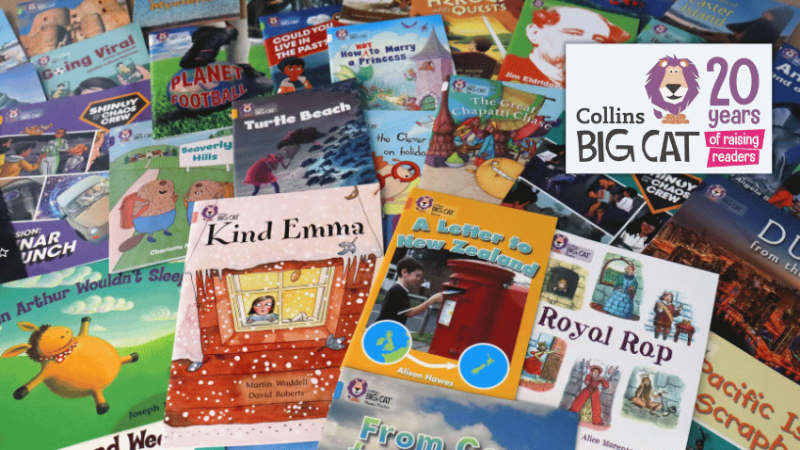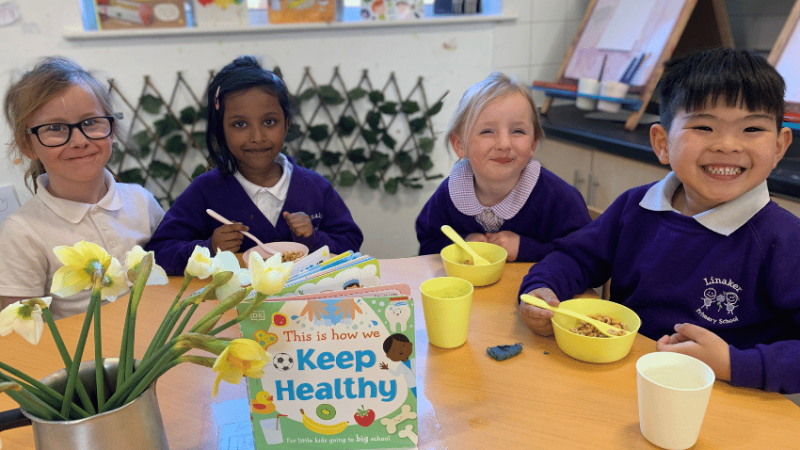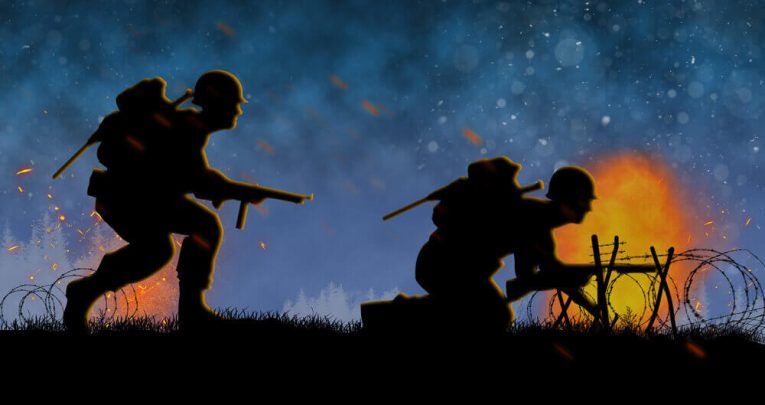KS2 poems – Best ideas, resources and worksheets
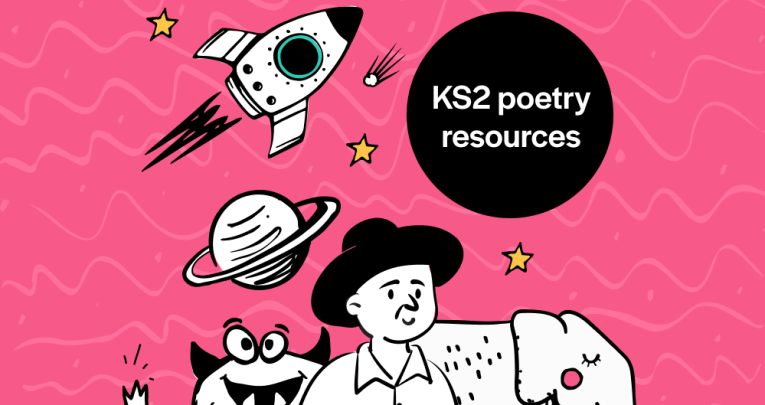
Improve primary pupils' poetry writing and comprehension skills with our selection of resources, lessons, activities and more…

- by Teachwire
- Classroom expertise and free resources for teachers

You may be a budding poet yourself or, frankly, a little afraid of it, but there’s no reason not to dive into teaching KS2 poems with this plethora of resources and ideas from poetry experts and teachers…
KS2 poetry resources
Pie Corbett poetry lessons
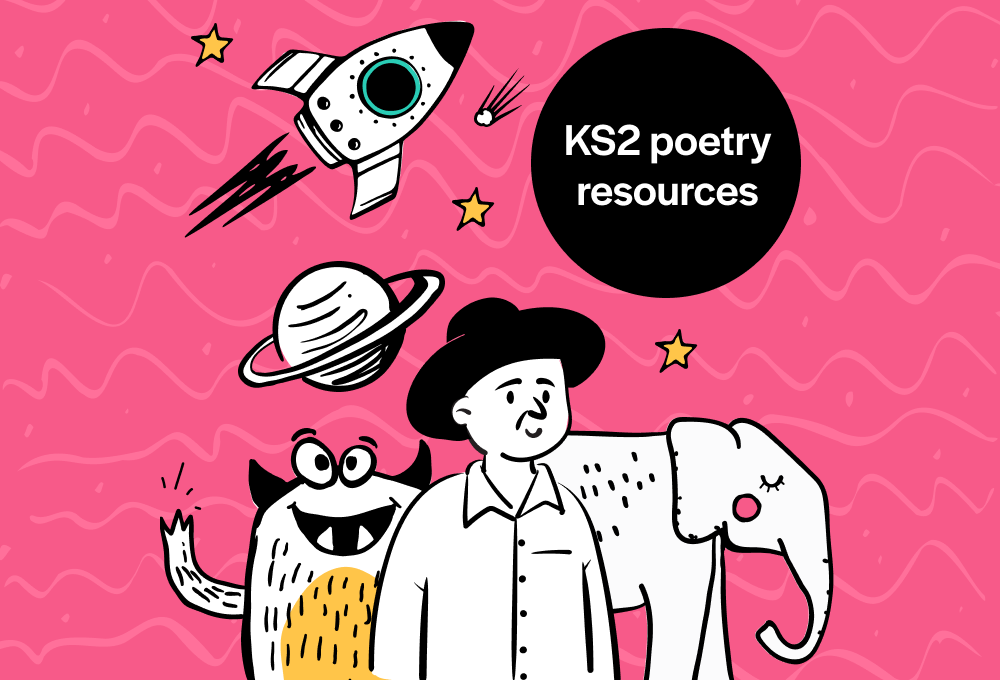
Inspire your KS2 students to express themselves and get creative with our exclusive Pie Corbett KS2 Poems Collection. Each of the seven packs include a Powerpoint of a poem and a PDF full of teaching ideas to help you power up your English lessons.
Poetry model text resource packs
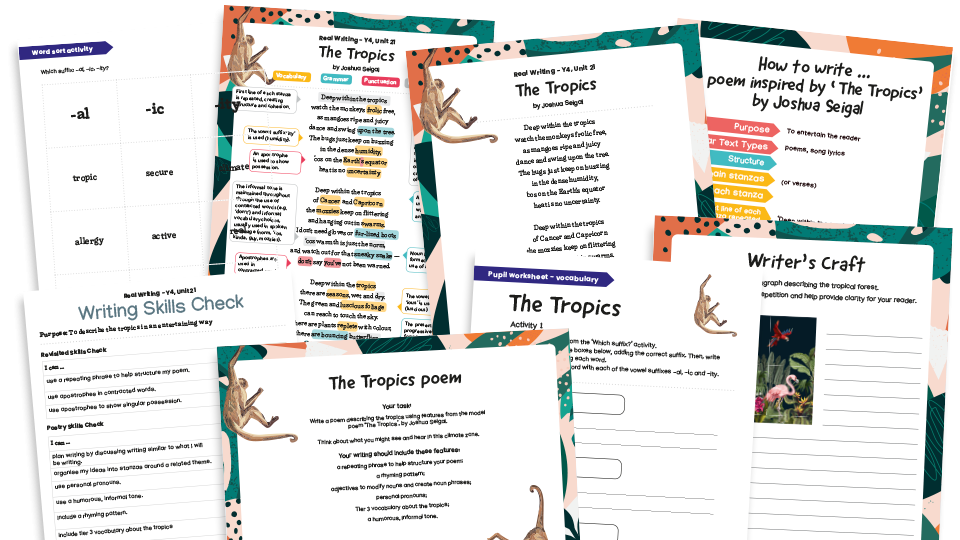
This selection of Real Writing poetry resources from Plazoom uses model texts by award-winning author Joshua Seigal as the jumping-off point to cover a variety of subjects.
Click the links below to check them out.
- Year 3 – Volcano Poem (curriculum link: geography – volcanoes)
- I Have… (curriculum link: English – writing for purpose)
- Year 4 – The Tropics (curriculum link: geography – climate zones, biomes and vegetation belts)
- Dreams of Escape (curriculum link: science – changing state)
- Water Cycle Haiku (curriculum link: geography – water cycle)
- Year 6 – Ancient Greece (curriculum link: history – Ancient Greeks)
- Rivers (curriculum link: geography – rivers)
Performance poetry lesson plan
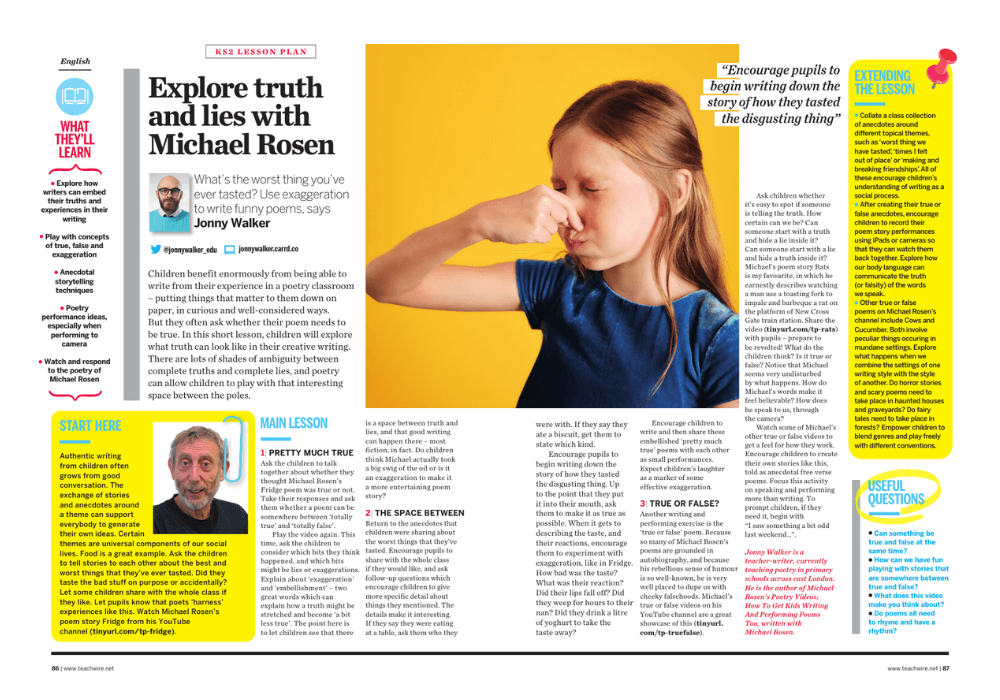
Use exaggeration to write funny KS2 poems with this free English lesson plan by teacher Jonny Walker. Children will play with concepts of true, false and exaggeration, using Fridge by Michael Rosen as a jumping off point.
- Read the findings of CLPE’s Power of Poetry Project.
- Read Poetry in Primary Schools: What We Know Works from CLPE.
- The Centre for Literacy in Primary Poetry Award (CLiPPA) Shadowing Scheme provides free resources to encourage children to perform and find the joy in poetry.
- Michael Rosen has written a series of very informative blog posts on teaching poetry in primary schools.
- Search CLPE’s poetry section for book recommendations, KS2 poems and resources.
- Listen to poets reading their own work at childrenspoetryarchive.org.
Write spooky sound poems inspired by Neil Gaiman
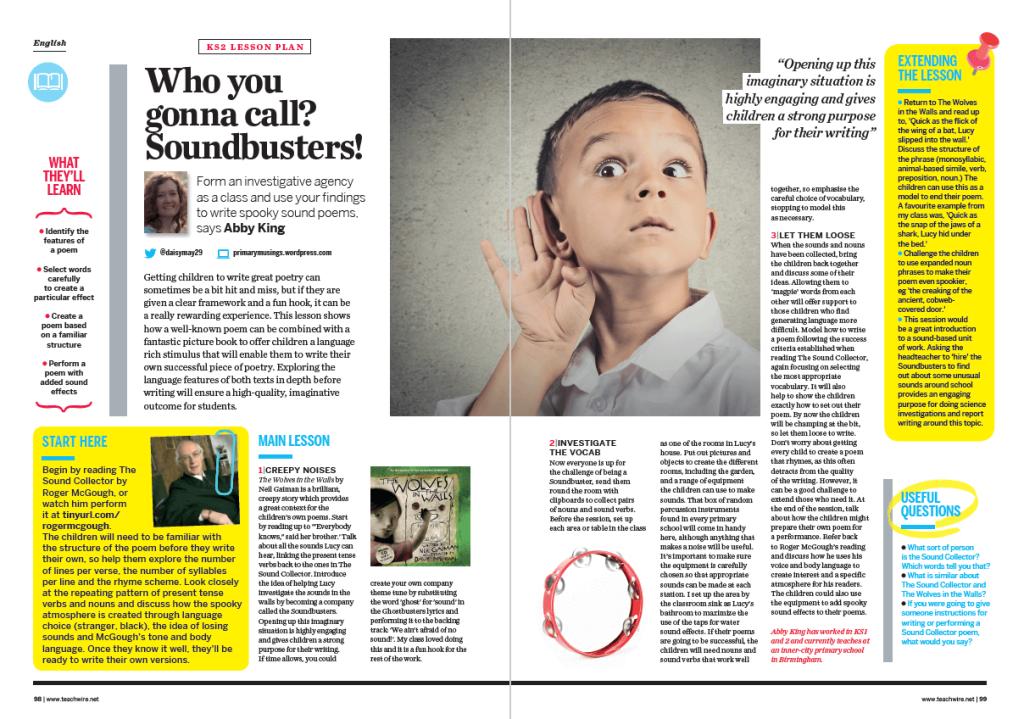
Getting children to write great poetry can sometimes be a bit hit-and-miss, but if they are given a clear framework and a fun hook, it can be a really rewarding experience.
This free KS2 poems lesson plan shows how a well-known poem can be combined with a fantastic picture book to offer children a language-rich stimulus that will enable them to write their own successful piece of poetry.
Listen to this Michael Rosen podcast
In episode 16 of Author In Your Classroom podcast Michael Rosen discusses migration and his poetry collection ‘On the Move’. There’s also a free resource pack to go along with it, which includes a PowerPoint, poem, images for a wall display, planning sheets, teacher notes and more.
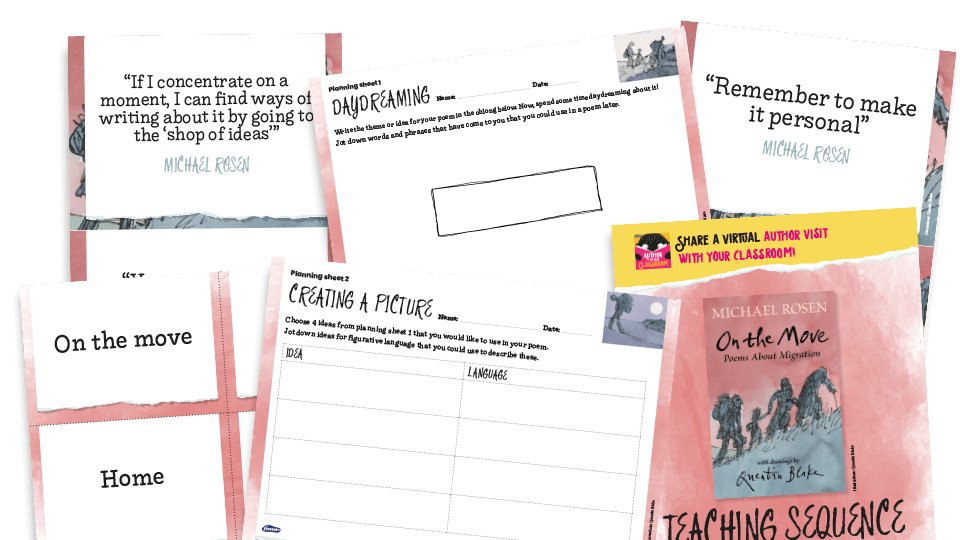
Five poets read their poems
How might thinking about ‘truth’ inspire a poet? Here are five of your pupils’ favourites reading a piece of their own work with a connection to the theme, and talking about some of the ideas behind it.
Watch the videos of Karl Nova, Michael Rosen, Rachel Rooney, Victoria Adukwei Bulley and Joseph Coelho reading their poems, then download the full text of the poems, alongside suggestions for teaching and learning activities related to each one.
Creating imaginative characterisation in poetry

Writing is hard; writing poetry is even harder. You have a lot to think about: structure, rhythm, rhyme and so on. Creating scaffolds for children can help them to really concentrate on the words they are using rather than structure.
In this free KS2 poems English lesson plan pupils take the basic creative structure of a poem (‘No Breathing in Class’ by Michael Rosen) and edit it to create a new one.
Write mischievous KS2 poems like Dahl’s Revolting Rhymes
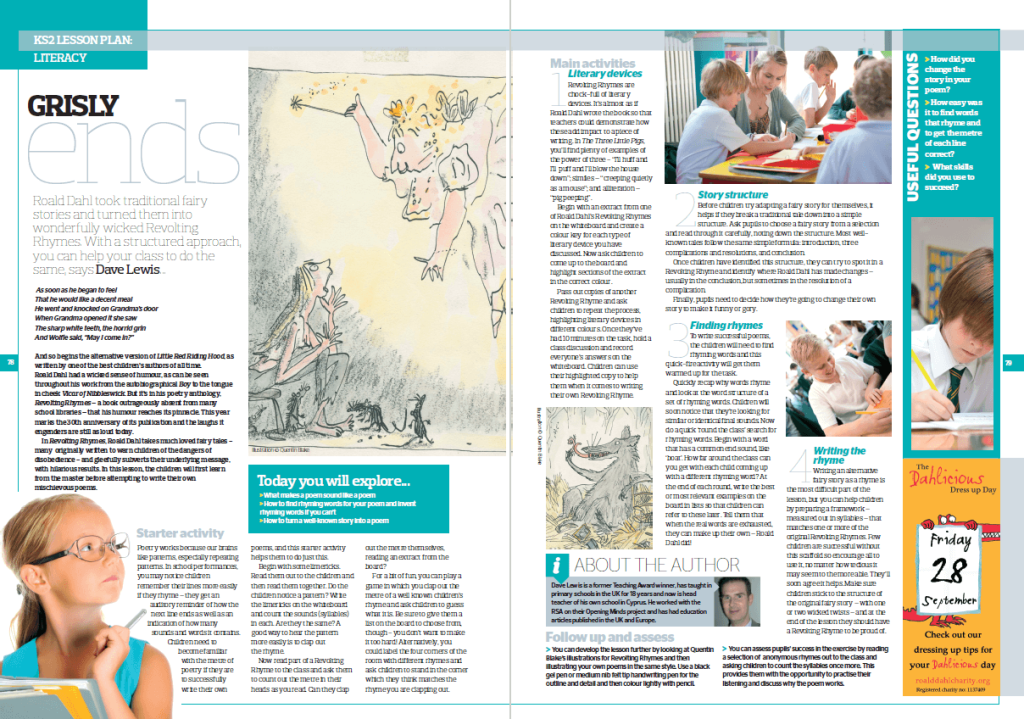
Roald Dahl took traditional fairy stories and turned them into wonderfully wicked Revolting Rhymes. With a structured approach, this free lesson plan can help your class do the same.
Performance poetry lesson
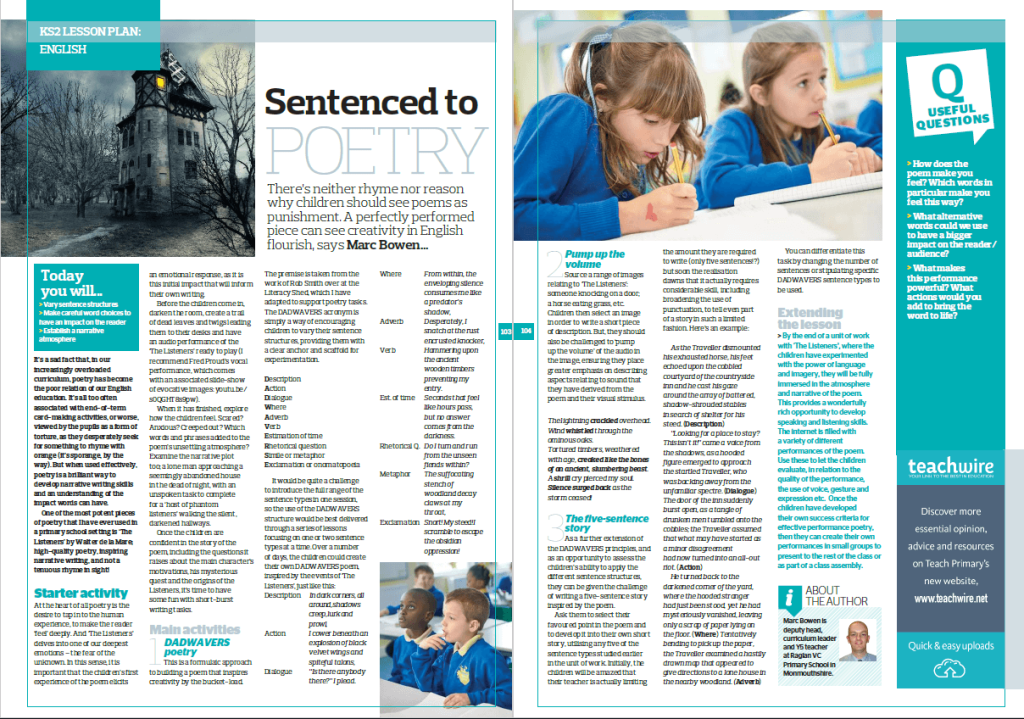
There’s neither rhyme nor reason why children should see poems as punishment. Used effectively, poetry is a brilliant way to develop narrative writing skills and an understanding of the impact words can have.
This free KS2 poems lesson plan uses one of the most potent pieces of poetry you can use in a primary school setting – ‘The Listeners’ by Walter de la Mare.
Refugee poem lesson plan
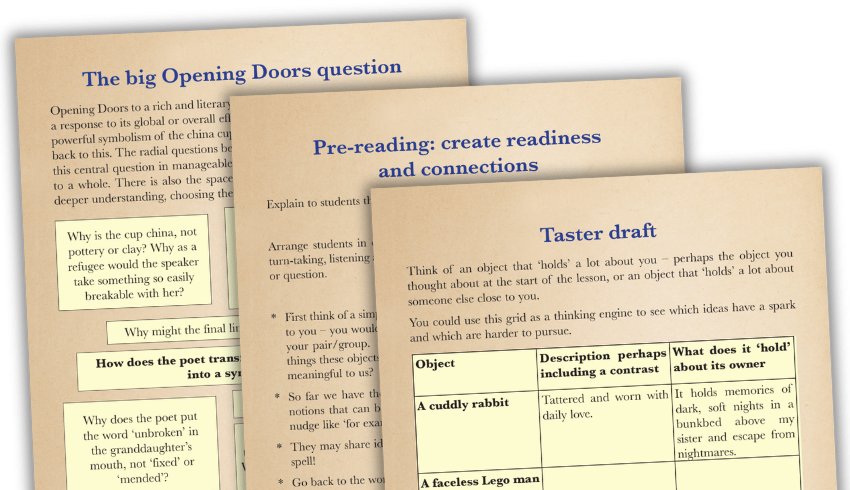
This KS2 lesson plan features a powerful refugee poem that poignantly depicts the impact of forced migration. Students will work towards reading the poem, concentrating on the speaker’s shifting emotions, and discover how the poem turns personal suffering into a symbol of hope and healing.
Nature poem templates
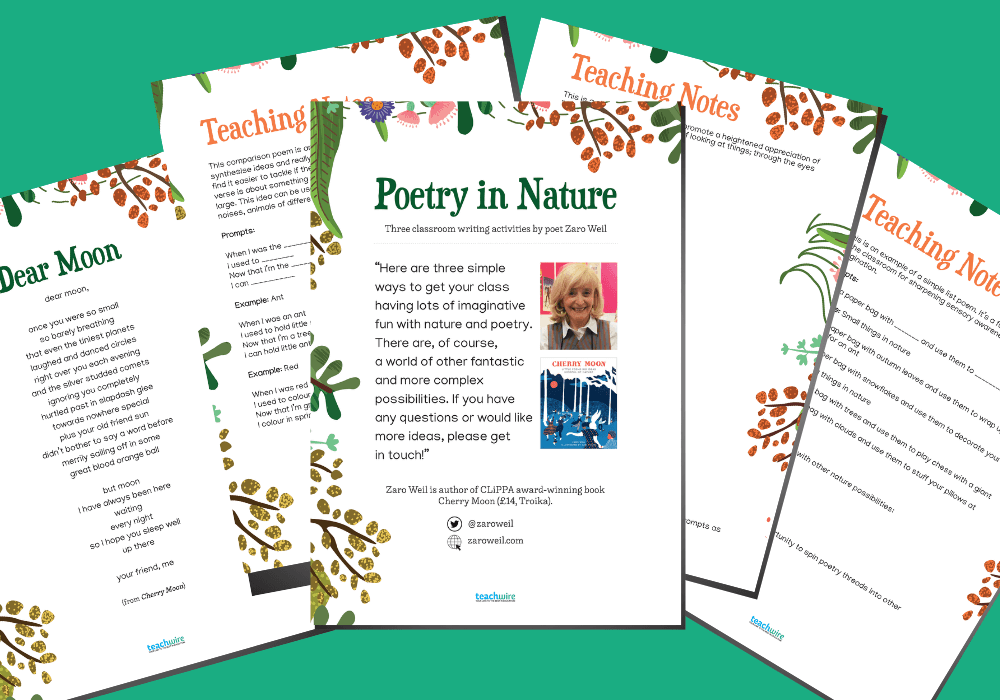
This KS2 poems download from poet Zaro Weil features poetry examples, poem templates and teacher notes to help your class have lots of imaginative fun with nature and poetry.
War poetry for KS2
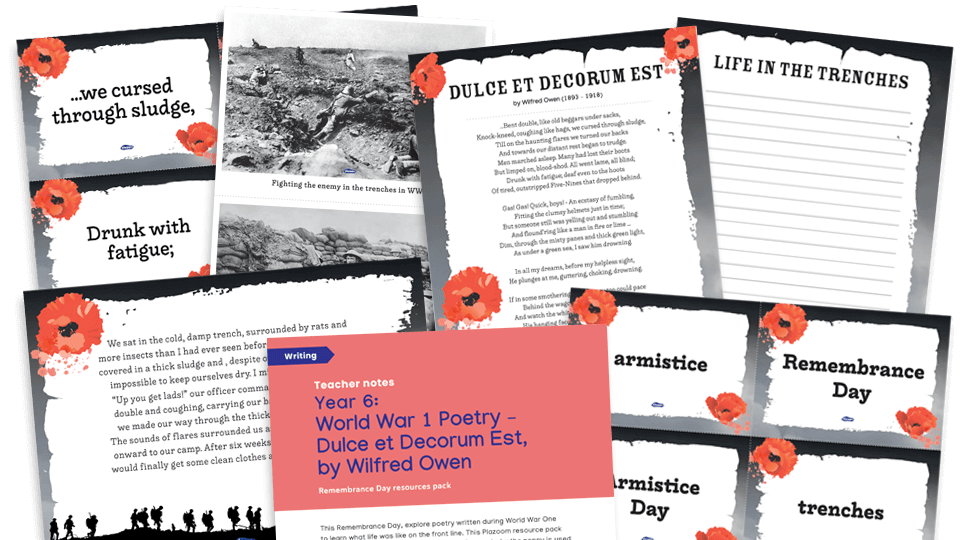
Explore World War One poetry to help Year 6 pupils understand what life was like on the frontline. This Plazoom resource pack includes information about Remembrance Day and why the poppy is used as a symbol for remembrance. You’ll explore the poem Dulce et Decorum Est by Wilfred Owen.
Pupils will then write their own narratives about life in the trenches, using ideas and vocabulary from Wilfred Owen’s poem.
A poem a day
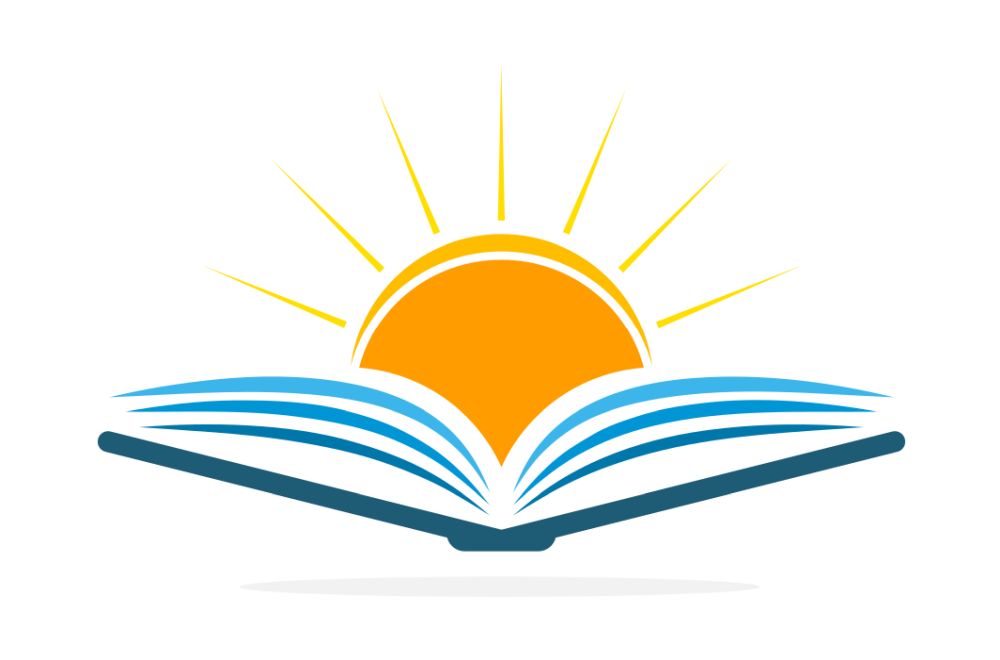
Want to expose children to the amazing language of nearly 2,000 different poems? Start by reading just one a day.
That’s the advice from Tre Christopher and Pet Henshaw. Read about why and how you can do this, what KS2 poems you should try and what resources will help.
5 ideas to help KS2 pupils find the power of poetry

Former headteacher and chief executive of CLPE, Louise Johns-Shepherd, explains how to inspire KS2 pupils with poetry…
1 | Make poetry available
Look for and make available collections and anthologies that open children’s eyes to what poetry is, and what it can do. This is something that previous winners of the CLPE Poetry Award, the CLIPPA, do particularly well.
Take 2017’s winner, Moon Juice by Kate Wakeling. This collection contains humorous poems, lyrical poems that follow rich rhythms, emotive poetry written from personal experience and poems that offer windows into the writer’s fascinations and direct, real-life experience.
Make sure that poetry is available to children, and that the poetry on offer shows that it is a multi-dimensional and exciting form.
2 | Read poetry aloud
Read poetry aloud often. Drop it into every moment of the school day, with no preconceived agenda. Give children the opportunity to hear and see a wide range of poets reading and performing their poetry. Children need to see the universality of poetry and that poetry is for them.
Seeing poems performed by the poets who wrote them opens up children’s perceptions about poetry. It is important to make sure that children have access to the work of a wide range of poets, and to the work of poets that reflect the realities of children in our schools.
“Give children the opportunity to hear and see a wide range of poets reading and performing their poetry”
Only then will children really grasp that poetry is a space for them.
Children need to feel the joy in reading poetry aloud themselves, joining in, dramatising and performing poems. If poetry is not given a voice, if it just stays on the page as a printed object, then it is not going to come alive for most children.
3 | Try ‘poetry papering’
Children need time to read, re-read and respond to poetry. However, we must make sure that we don’t jump into trying to dissect the poem before giving the children the opportunity to internalise and respond to it at a personal level.
A technique like ‘poetry papering’ works really well. Select a number of different poems, illustrating different poets, styles and forms. Photocopy the poems and pin them up around the classroom or another space for the children to find and explore at their leisure.
They can read, pass over, move on and then select one they’d like to talk about with someone else. This encourages children to enjoy the experience of simply reading a poem, to relish the uncertainties of meanings and the nature of the knowledge and emotional responses that poems invoke in them as readers.
Let them look for connections, ask questions, explore what they like about poems and the use of language. You can use this as an opportunity to introduce children to the names of specific forms or devices.
You might introduce this by way of what Michael Rosen calls ‘secret strings’ (What is Poetry? Walker 2016). He talks about the importance of discovering how the poet might have used assonance, alliteration, imagery, rhythm and sound.
4 | Invite in practising poets
Seeing a poet bring their own work to life and beginning to understand what that means in terms of the creation of poetry helps children to see themselves as writers. And teachers also benefit from working alongside poets.
During our Power of Poetry project, educators found their teaching was improved by understanding the creative process.
“Teachers also benefit from working alongside poets”
Listen to poets talk about their writing process; what inspires them, how they work, how they draft, edit and redraft – all this yields a wealth of information to consider the freedoms and support we give children in their own writing.
Trending
5 | Support children to become poets
In order to write poetry, children need to experience different kinds of poems so that they can see how different forms work: sing-song rhythms of chants, rhymes and refrains, the joy of humorous and nonsense verse and poems that explore different forms, such as rhyme, free verse, haiku and sonnets.
Children then have a context to discover the rich history of poetry, exploring where these forms came from and how they work as well as showing them what they can do in their own writing.
Through writing poetry children are encouraged to reflect on their experience, to recreate it, shape it, and make sense of it. In a poem, it is possible to give form and significance to a particular event or feeling and to communicate this to the reader or listener.
How to use a poetry unit to build vocabulary

Experimenting with verse helps children to develop powerful language skills that will shine out in all their writing, explains Jane Andrews, English adviser at HFL Education…
When writing, in their eagerness to get everything correct, children sometimes struggle to hit the right tone for the reader. A key issue in the past has been children thinking they have to use the ‘wowiest’ word available in a thesaurus, rather than the ‘right’ word.
They may also be working towards lengthy success criteria and, when this process is not focused on the purpose of writing and its effect on the reader, it can send the outcome awry.
The following activities show how using a poetry unit to build vocabulary before a narrative or non-fiction unit can lift children’s understanding of well-chosen language – how to paint a picture with words and play with the reader’s emotions.
Free verse ideas
With free verse poetry, children don’t need to worry about clause structures and, in fact, this is a place where playing with and breaking the rules is encouraged.
Let’s imagine we have an upcoming narrative or non-fiction unit on dragons. Spend a week on the following free verse ideas, which will build the children’s vocabulary and help them consider how this language affects the reader.
A shared read of Jackie Morris’s wonderful text, Tell Me A Dragon might be a good starting point and a way of firing up everyone’s creative juices.
With all of the vocabulary-building approaches, it is essential that you provide some words that children know but don’t use themselves, and a few they might not know but would be very useful.
Develop vocab with acrostics
This approach helps children consider whether the vocabulary they are using is appropriate for the effect they wish to create. Is their dragon, for example, friendly? Might he be a hero? Or deadly?
Ask pupils to generate as many words as possible that might relate to their dragon beginning with each letter of the main noun itself (D-R-A-G-O-N).
Add some suggestions and a variety of pictures to support and develop this process. You can even model it using a different subject, eg ‘T-E-A-C-H-E-R-S’.
Eventually, children can write an acrostic poem, letting those words set the tone for the rest of each line:
Dragons
Rage screaming from deadly eyes
Angry fire destroying everything in its path
Gigantic eyes, never missing a trick
Odorous steam streaming from its cavernous nostrils
Noxious breath
Scales like a knight’s armour, shielding from attack
Cut-up poem
Take a short poem or a verse from a poem you will be studying. Print it, using double line spacing, and then cut up the lines.
Place these in an envelope and then ask children to put the lines in an order they believe makes sense.
Sometimes they will be able to begin with the only line that starts with a capital letter and put it at the top, then place the line ending with a full stop at the bottom. But not all poems give such clues. This is immediately something to discuss.
There is no wrong and right; it is the conversations evolving from their important thought processes. You might want to choose poems about animals, such as ‘My Brother Bert’ by Ted Hughes or ‘Penguins on Ice’ by Celia Warren.
“It is the conversations evolving from their thought processes that are important”
Suitable similes
I’m sure we’ve all seen a variety of inappropriate similes. I’ve seen ‘as white as ice cream’ to show how white somebody had turned in fear.
We have only to ask the children if they want to put a picture of an ice cream into somebody’s mind while building the tension in our story and they realise it’s inappropriate. This approach helps them to consider how to develop appropriate similes and metaphors.
We start with the clichés such as ‘As light as ….’ and the children respond ‘a feather’. We then model how to push this simile by explaining that I could think of something lighter.
I would need to think of something really small, like a fairy. Then I would push it to find something even smaller like a fairy’s eyelash and then a teardrop. Now I have as light as the teardrop on the end of a fairy’s eyelash.
Again, this is only appropriate if I want something as lovely as a fairy in the reader’s mind. Going back to my dragons I might have ‘its fire is like a scorching wind striking down anything in its path’.
I could then change that to a metaphor by saying that ‘its fire is a scorching wind, striking down anything in its path.’
Playing with grammar
This is a simple game with great results. First of all, decide as a whole class the feeling we want to create about our dragon, eg dangerous, endangered, friendly, etc. Mine is ‘dangerous’. (The grammar exemplified is for Year 4, but you would choose word classes appropriate for your pupils.)
- Fold a piece of paper in half and half again, creating four columns down the page. Write four verbs, one in each column to describe your dragon, eg screeching, tearing, attacking, swooping.
- Fold the paper over and pass to the next person, who writes four determiners, eg one, some, a, few.
- Fold the paper over again and pass to the next person, who writes four nouns, eg breath, nostrils, eyes, scales.
- Repeat this process, with the next person writing four prepositions, eg beside, with, under, beneath.
The paper is then passed to the final person who has to create a poem.
Each line must include a word taken from each column, but this can be placed anywhere within the line along with any other language. For example:
5 brilliant collections of poetry to have in your classroom
Charlotte Hacking, learning programmes leader at the Centre for Literacy in Primary Education (CLPE) picks her favourites…
A Great Big Cuddle by Michael Rosen
A rich mix of poems that play with words and sounds, engage young readers with rhythms and rhymes and show that poetry can tell a story or share our feelings. Poems that children will want to join in with, move to and talk about.
The Dragon With a Big Nose by Kathy Henderson
This collection explores a range and breadth of forms and styles, taking them from the familiar comfort of rhythm and rhymes to the introduction of more sophisticated poetic devices such as assonance, imagery and metaphor. It’s out of print, so you’ll need to track down a preloved copy!
Things You Find in a Poet’s Beard by AF Harrold
A perfect KS2 poems collection with a mix of themes and poetic forms. The poems use clever humour and wordplay as well as evocative imagery, which enables children to visualise and feel like they are in the moments being described.
Rhythm and Poetry by Karl Nova
Hip hop artist Karl’s poems are infused with the lyrical rhythms of his music, which makes them irresistible for children to want to perform, but this is also a book that could inspire many to take up writing themselves.
The Rainmaker Danced by John Agard
These rich and lyrical poems, set against striking illustrations by Satoshi Kitamura, invite us to consider our own impact on each other and the environment and to question, challenge and reflect. In the current climate of fake news, poetry such as this is essential in every classroom.
Browse more ideas in our National Poetry Day round-up.





